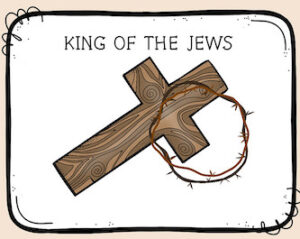What Is In A Name: King of the Jews
King of the Jews
6 Now it was the custom at the festival to release a prisoner whom the people requested. 7 A man called Barabbas was in prison with the insurrectionists who had committed murder in the uprising. 8 The crowd came up and asked Pilate to do for them what he usually did.
9 “Do you want me to release to you the king of the Jews?” asked Pilate, 10 knowing it was out of self-interest that the chief priests had handed Jesus over to him. 11 But the chief priests stirred up the crowd to have Pilate release Barabbas instead.
12 “What shall I do, then, with the one you call the king of the Jews?” Pilate asked them.
13 “Crucify him!” they shouted.
14 “Why? What crime has he committed?” asked Pilate.
But they shouted all the louder, “Crucify him!”
15 Wanting to satisfy the crowd, Pilate released Barabbas to them. He had Jesus flogged, and handed him over to be crucified.
16 The soldiers led Jesus away into the palace (that is, the Praetorium) and called together the whole company of soldiers. 17 They put a purple robe on him, then twisted together a crown of thorns and set it on him. 18 And they began to call out to him, “Hail, king of the Jews!”
…25 It was nine in the morning when they crucified him. 26 The written notice of the charge against him read: the king of the jews.
(Mark 15:6-18; 25-26, NIV)
When God established the nation of Israel, no earthly king was crowned. The Israelites had their king, the Lord God. Yet they rejected Him. They want to be like all the other nations in the world. They demanded an earthly king. Even after being warned about the dangers such a man would bring, they continued to insist upon having an earthly king. So the Lord God granted them their request, anointing Saul as King of Israel.
 Quite quickly, the anointed kings began failing the nation of Israel, focusing instead on their own selfish desires. Eventually, Jerusalem, the once shining capital of the Israel nation, was demolished by the Babylonians, its inhabitants carried off. During these dark times, the Israelites took comfort in the prophecies that assured them a Savior, a king, was coming.
Quite quickly, the anointed kings began failing the nation of Israel, focusing instead on their own selfish desires. Eventually, Jerusalem, the once shining capital of the Israel nation, was demolished by the Babylonians, its inhabitants carried off. During these dark times, the Israelites took comfort in the prophecies that assured them a Savior, a king, was coming.
This Savior would create a new covenant and establish God’s kingdom. Most Israelites, including the religious leaders of Jesus’ day, believed this meant an earthly king who would squash the Roman rulers. Instead, Jesus came to establish a heavenly kingdom where all who were willing to believe would be welcomed.
The name King of the Jews did not originate from Jesus. He never called Himself that, but He also did not dispute it when Pilate stated the charge against Him. It was then Pilate who ordered that the sign “King of the Jews” be posted on the cross. The Jewish religious leaders opposed the sign, seeking to have it removed, for Jesus was not the “King of the Jews” that they wanted.
Affixing a notice stating the crime of the crucified was not an uncommon practice. Pilate, in part, was mocking the Jews with the sign. The Jewish religious leaders had taken Jesus to Pilate and accused Him of setting Himself up as a king, a crime for which the Romans could execute Him. But the sign was accurate. Jesus was and is the King of the Jews, but He is also the King of Kings.
So what does this mean for us? Jesus is not only the King of the Jews but the King of Kings! We know that Jesus is the prophesied Messiah because He fulfilled every prophecy made. The Messiah, the Savior, came to provide a path of salvation to all mankind. Because He fulfilled the prophecies, we, as Gentiles, can rest assured in our eternal salvation. And one day, everyone will bow before Him, acknowledging Him as King.
For more information regarding how your financial support can help, please click here.
